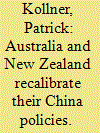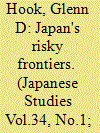|
|
|
Sort Order |
|
|
|
Items / Page
|
|
|
|
|
|
|
| Srl | Item |
| 1 |
ID:
130241


|
|
|
|
|
| Publication |
2014.
|
| Summary/Abstract |
I had never been a big fan of American exceptionalism. It was too self-referential, self-identifying, self-focused for my personal comfort. Then one bitterly cold day in February 1994, I was wandering through the open-air market in Sarajevo. The market had been hit by a single mortar round the previous weekend and sixty-eight people had been killed. Holes made by fragments from the 120-mm shell were still visible in the asphalt.
As I stared at the gouged surface in my battle dress and parka, Sarajevans began to come up to me, point to the small American flag on my upper sleeve, give a hesitant thumbs-up gesture, and whisper, almost prayerfully, "USA, USA."
Edward Snowden's leaks have fixated the media and the public on privacy and espionage, but the larger and more complex debate on protecting American security in the 21st century has been wanting.
At that point it became clear to me that it mattered less whether I thought America was exceptional. What mattered was that many people around the world thought that we were, and expected us to act accordingly. In many ways this is less something we have earned or even want, and more the product of historical circumstance. But a burden has clearly been ours, and when it is no longer ours the best judgment we can hope for is something along the lines of "As global hegemons go, these guys weren't bad." Now, under President Obama, the United States is involved in a redefinition or at least a recalibration of that exceptional role.
|
|
|
|
|
|
|
|
|
|
|
|
|
|
|
|
| 2 |
ID:
178744


|
|
|
|
|
| Summary/Abstract |
Australia and New Zealand (NZ) have in recent years been at the forefront of the growing confrontation between the ‘West’ and China. Despite very close economic ties with China, both countries have substantially changed their approaches to dealing with the People’s Republic. In this article, I take stock of and compare the Australian and NZ recalibrations of their respective China policies, highlighting similarities as well as differences across the two country contexts and over time. It was Australian federal state actors who first embarked on a major ‘reset’ of China policy, culminating in legislation on espionage and foreign interference in 2018. After a change in government, state authorities in NZ appeared to follow Australia’s lead. However, NZ’s adjustment of its China policy has been less straightforward, more contested and overall more ambiguous. Small-state theories partly explain NZ’s more ambivalent approach. A more comprehensive understanding can be gained by reference to how NZ differs from its Tasman neighbour in terms of strategic outlook, including the paramount importance accorded to trade in its foreign affairs.
|
|
|
|
|
|
|
|
|
|
|
|
|
|
|
|
| 3 |
ID:
131331


|
|
|
|
|
| Publication |
2014.
|
| Summary/Abstract |
This article investigates Japan's current role in the Senkaku Islands. The government maintains administrative control of these tiny, uninhabited islands and rocks at the frontier of Japan, but both the governments of China and Taiwan dispute Japanese claims to sovereignty and claim sovereignty over the islands themselves. Whilst much of the extant literature examines these competing claims, this article instead explores the relationship between risk, sovereignty and governance at the frontiers of Japan. It seeks to demonstrate in particular how the governance of Japan's maritime frontiers reflects a broader process of the recalibration of risk by the Abe Shinz? government as part of ending the postwar regime. Its main purpose is twofold: first, to illuminate how the government carries out administrative control and governance of a remote, uninhabited territory when sovereignty is challenged and in dispute; and second, to elucidate how the government's recalibration of risk generates a range of costs for the Japanese market and society as a result of the deterioration of relations with China arising from the way risk is being recalibrated.
|
|
|
|
|
|
|
|
|
|
|
|
|
|
|
|
|
|
|
|
|